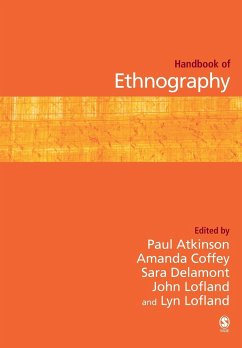"I wish the Handbook of Ethnography had been available to me as a fledgling ethnographer. I would recommend it for any graduate student who contemplates a career in the field. Likewise for experienced ethnographers who would like the equivalent of a world atlas to help pinpoint their own locations in the field."
- Journal of Contemporary Ethnography
"No self-respecting qualitative researcher should be without Paul Atkinson's handbook on ethnography. This really is encyclopaedic in concept and scope. Many "big names" in the field have contributed so this has to be the starting point for anyone looking to understand the field in substantive topic, theoretical tradition and methodology."
- SRA News
Ethnography is one of the chief research methods in sociology, anthropology and other cognate disciplines in the social sciences. This Handbook provides an unparalleled, critical guide to its principles and practice.
The volume is organized into three sections. The first systematically locates ethnography firmly in its relevant historical and intellectual contexts. The roots of ethnography are pinpointed and the pattern of its development is demonstrated.
The second section examines the contribution of ethnography to major fields of substantive research. The impact and strengths and weaknesses of ethnographic method are dealt with authoritatively and accessibly.
The third section moves on to examine key debates and issues in ethnography, from the conduct of research through to contemporary arguments.
The result is a landmark work in the field, which draws on the expertise of an internationally renowned group of interdisicplinary scholars. The Handbook of Ethnography provides readers with a one-stop critical guide to the past, present and future of ethnography. It will quickly establish itself as the ethnographer's bible.
- Journal of Contemporary Ethnography
"No self-respecting qualitative researcher should be without Paul Atkinson's handbook on ethnography. This really is encyclopaedic in concept and scope. Many "big names" in the field have contributed so this has to be the starting point for anyone looking to understand the field in substantive topic, theoretical tradition and methodology."
- SRA News
Ethnography is one of the chief research methods in sociology, anthropology and other cognate disciplines in the social sciences. This Handbook provides an unparalleled, critical guide to its principles and practice.
The volume is organized into three sections. The first systematically locates ethnography firmly in its relevant historical and intellectual contexts. The roots of ethnography are pinpointed and the pattern of its development is demonstrated.
The second section examines the contribution of ethnography to major fields of substantive research. The impact and strengths and weaknesses of ethnographic method are dealt with authoritatively and accessibly.
The third section moves on to examine key debates and issues in ethnography, from the conduct of research through to contemporary arguments.
The result is a landmark work in the field, which draws on the expertise of an internationally renowned group of interdisicplinary scholars. The Handbook of Ethnography provides readers with a one-stop critical guide to the past, present and future of ethnography. It will quickly establish itself as the ethnographer's bible.

